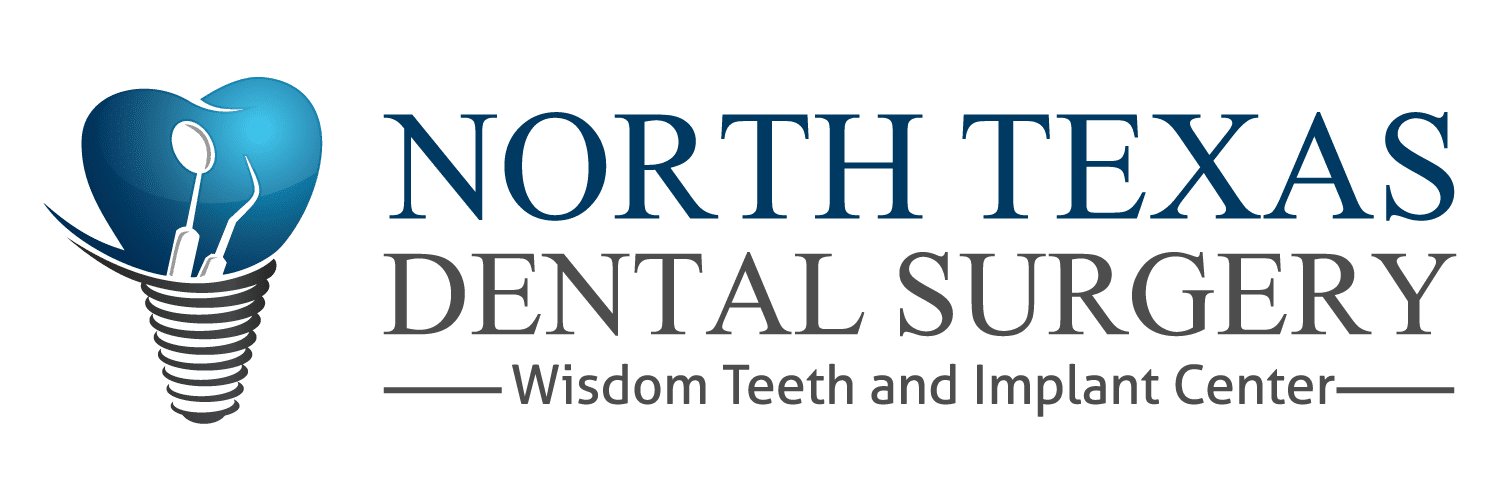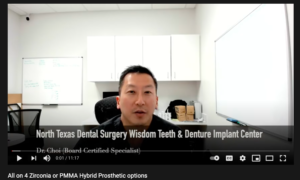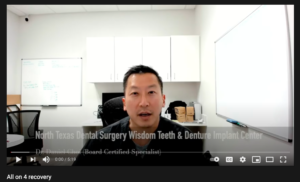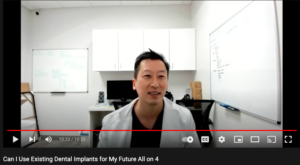Correct hygiene care of the All on 4 dental prosthesis is important to ensure the longevity of the dental implants. In the first couple weeks following your surgical procedure, saltwater rinses are necessary for proper oral care. At-home cleanings will be different depending on the type of material the prosthesis is made out of. In-office cleanings will be the same for all types of prostheses.
In-office cleanings are all performed the same to ensure the highest quality of hygiene care. First, the material covering the access holes will be removed and the prosthesis unscrewed. The prosthesis will then be scrubbed and placed in an ultrasonic cleaner. The multi-unit abutments will be cleaned and polished. Once the prosthesis is cleaned, it will be screwed back in and the access holes will be covered. Depending on if the prosthesis is a temporary or zirconia final, the access holes will be filled with a different material. The access holes are filled with a different material because during the temporary phase cleanings are needed more often.
Temporary Cleaning
Following treatment, a majority of patients are put in a temporary prosthesis for a limited amount of time. This prosthesis is typically made out of acrylic or plastic material. For the first 4-6 months following surgery, the bone and gums continue to change shape through a process called remodeling. The changing shape affects the space between the prosthesis and gums. This space is where food gets trapped and can become very irritating to the gums. At-home cleanings and in-office cleans are very important.
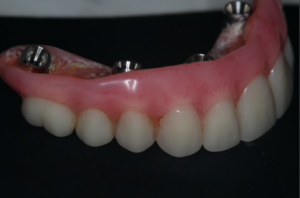
At-home cleanings are done twice a day. Brushing with a non-abrasive toothpaste and soft toothbrush is imperative to not scratch the prosthesis. This material is not very durable and can stain very easily. Once cleared by the doctor, add the WaterPik into the daily oral hygiene routine to get into those hard-to-reach places. In-office cleanings will be done 1 month, 3 months, and then 6 months following treatment. In-office cleaning is very important since bacteria can build up very easily on the underside of the acrylic. In-office cleanings will also allow the doctor to evaluate the implants and ensure the recovery process is going well.
Final Cleaning
Once the final prosthesis has been delivered, cleanings are still necessary to maintain proper oral health. However, the final prosthesis will fit snugly against the gums. Due to this, cleanings will be less often as compared to the temporary prosthesis timeline. The gums and bone are fully healed and no longer change shape, eliminating unwanted space. Depending on what your final prosthesis is made out of will affect how you clean it at home and how often you will return for in-office cleanings.
A hybrid titanium bar or acrylic final prosthesis needs to be cleaned in-office at least every 6 months. This is recommended because bacteria is more common to build upon this type of material. A hybrid metal bar or acrylic prosthesis requires more maintenance to ensure calculus, tarter, and staining doesn’t occur. At-home cleanings will need to be performed twice a day. The teeth of the prosthesis will need to be brushed as normal and mouthwash as needed. The Waterpik will be essential for ensuring a proper clean around the edges of the prosthesis in between in-office cleanings.
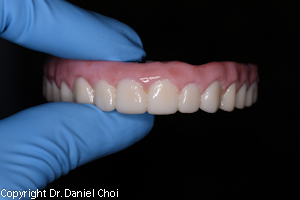
If the final prosthesis is Zirconia, cleanings can be performed once a year. Zirconia prostheses are tarter resistant and stain resistant, allowing them to be seen for less in-office maintenance. At-home cleanings for zirconia prosthesis can be performed similarly to traditional oral maintenance. Brush twice a day, use mouthwash as needed, and Waterpik any remaining debris. Zirconia is very durable and nearly impossible to break. This allows the patient more freedom as if they were their natural teeth.
